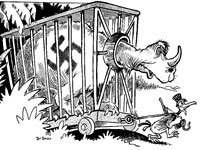The Origins of the Vietnam War
From the Gilder Lehrman Institute of American History website:
"Most discussions of the Vietnam War consider whether or not President John F. Kennedy could or would have withdrawn U.S. troops from the country, thus avoiding a long and bloody conflict. In this lecture, John Prados, a senior fellow of the National Security Archive in Washington, D.C., argues that America's path to Vietnam was set long before Kennedy took office. Near the end of World War II, President Franklin Roosevelt allowed the French to maintain a foothold in Indochina (as Vietnam and its neighbors were then known). By the 1950s, when France began to cast its battle with Vietnamese nationalists as a fight against communism, the United States was already, irrevocably drawn in."
